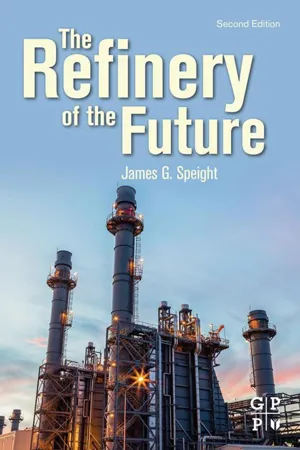
- 656 pages
- English
- ePUB (mobile friendly)
- Available on iOS & Android
The Refinery of the Future
About this book
The Refinery of the Future, Second Edition, delivers useful knowledge that will help the engineer understand the processes involved, feedstocks, composition and future technologies. Covering the basic chemistry, commercial processes already in use and future innovation, this reference gives engineers and managers the tools needed to understand refining products, feedstocks, and the processes critical to convert feedstocks to desired outcomes. New information concerning tight shale formations and heavy oil process options is included for today's operations. Rounding out with future uses in shale, bioliquids and refinery configurations, this book gives engineers and refinery managers the knowledge to update and upgrade their refinery assets.- Links basic petrochemical and refinery knowledge into application for today's oil and gas refining industry- Gives insights into the development and applications of refining process technology, along with the types of feedstock and their properties- Updated with a focus on crude oils recovered from tight shale and sandstone formations, along with increased emphasis on heavy oil and tar sand bitumen
Frequently asked questions
- Essential is ideal for learners and professionals who enjoy exploring a wide range of subjects. Access the Essential Library with 800,000+ trusted titles and best-sellers across business, personal growth, and the humanities. Includes unlimited reading time and Standard Read Aloud voice.
- Complete: Perfect for advanced learners and researchers needing full, unrestricted access. Unlock 1.4M+ books across hundreds of subjects, including academic and specialized titles. The Complete Plan also includes advanced features like Premium Read Aloud and Research Assistant.
Please note we cannot support devices running on iOS 13 and Android 7 or earlier. Learn more about using the app.
Information
Table of contents
- Cover image
- Title page
- Table of Contents
- Copyright
- Preface
- 1. Feedstock types and properties
- 2. Introduction to refining processes
- 3. Refining chemistry
- 4. Distillation
- 5. Thermal cracking
- 6. Catalytic cracking
- 7. Deasphalting and dewaxing
- 8. Desulfurization, denitrogenation, and demetalization
- 9. Hydrocracking
- 10. Non–fossil fuel feedstocks
- 11. Production of fuels from nonfossil fuel feedstocks
- 12. Synthesis gas and the Fischer–Tropsch process
- 13. Types and properties of fuels from nonfossil fuel sources
- 14. A biorefinery
- 15. The refinery of the future and technology integration
- Conversion factors
- Glossary
- Index